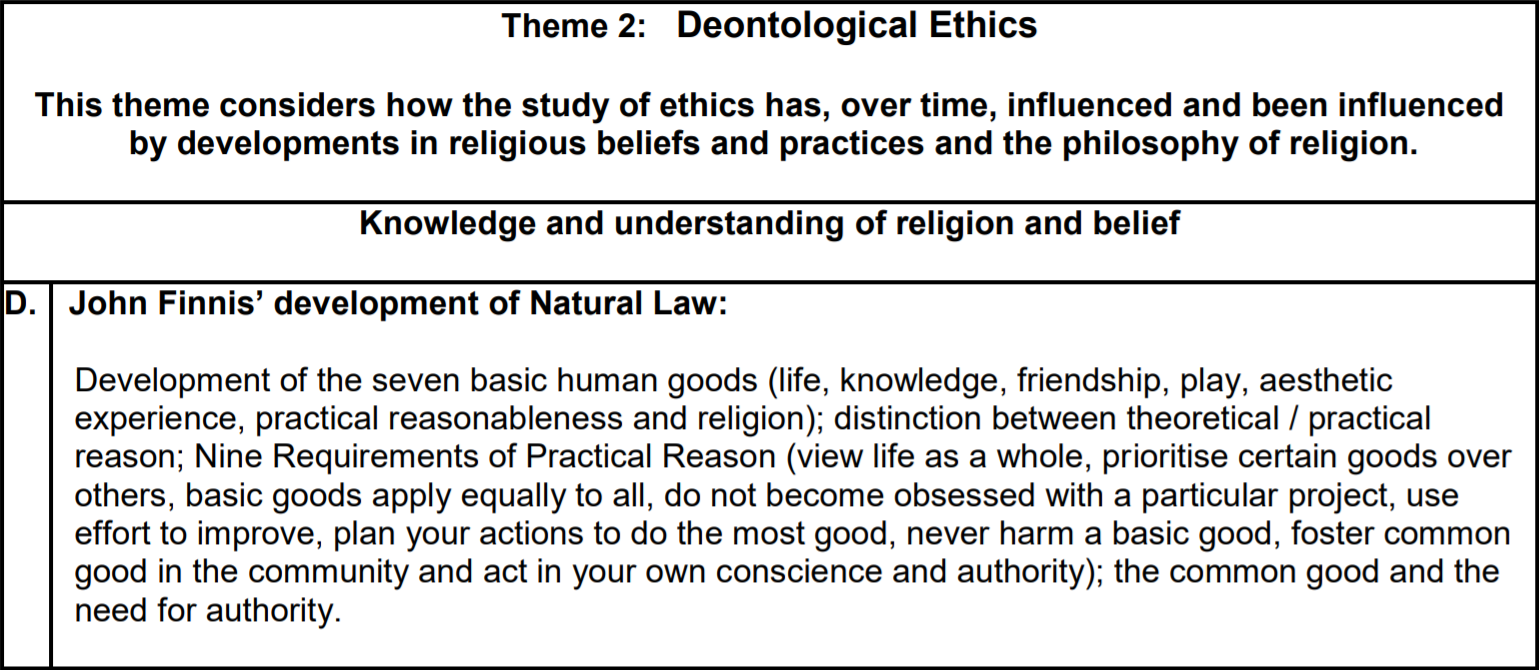Finnis
John Finnis’ development of Natural Law
John Finnis develops Aquinas' Natural Law, a deontological approach based on the idea that humans have a purpose, and that certain activities help us fulfil our purpose. In particular, Finnis is a lawyer (a Queen's Counsel in fact), who wrote 'Natural Law and Natural Rights' in 1980. Finnis argues that there are certain basic goods that are self-evident. So for Finnis, it is better for humans to live in a civilised society with laws that uphold the basic goods. Ethics is about finding a way to ensure humans can flourish, working together for the common good.
Finnis is not a rule utilitarian. A rule utilitarian would support laws that tend to lead to the greater good. For example, when considering capital punishment, a utilitarian would consider how useful it is. In March 2018, Donald Trump suggested using the death penalty for drug dealers. In 2016, over 64,000 Americans died of a drug overdose. It would be easy to argue that using the death penalty for a few drug dealers could prevent the deaths of a much larger number of drug users. Finnis would not be interested in the numbers, but in whether the death penalty would uphold the rule of law in this situation. A drug dealer is selfishly putting their own interests ahead of the well being of others. It is reasonable to have laws preventing someone selling products that cause harm. Human life is one of the basic goods, so Finnis sees the need for authority and laws to protect human life and prevent the sale of harmful drugs. However, he would not support a law that ended someone's life because they were a drug dealer. This would undermine the common good, because it would go against the basic good of human life.
For Finnis, there are seven basic human goods:
- Life
- Knowledge
- Friendship
- Play
- Aesthetic experience
- Practical resonableness
- Religion
Theoretical reason tells us that these basic goods are true - they are self-evident. You couldn't imagine a society where there was no respect for life, as it wouldn't be a society at all. Similarly, you couldn't argue against respect for knowledge, as any argument would require using knowledge, and so on.
Practical reason takes the next step of looking at how to protect all of the basic goods in practice. Finnis suggests nine requirements of practical reason:
- View life as a whole
- Prioritise certain goods over others
- Basic goods apply equally to all
- Do not become obsessed with a particular project
- Use effort to improve
- Plan your actions to do the most good
- Never harm a basic good
- Foster common good in the community
- Act in your own conscience and authority
Take the example of immigration. Finnis would agree that all humans, wherever they live, should have the basic human goods as listed earlier. This is a principle of theoretical reason. However, practical reason would ask how we can achieve this. Across Europe, over a million people applied for asylum in 2015 and 2016, although this dropped to 705,000 in 2017. The UK can be compared to Germany in the EU, who received 31% of all applications for asylum from non-EU countries (more than 6 times the UK's 5%). Some people might claim that the German government became 'obsessed with a particular project' when it chose to let in so many refugees. The Hungarian government opposed the EU's migrant quota scheme, claiming in 2016 that Europe has 900 areas where authorities have 'no control'. Finnis would say that people in each country need to 'act in their own conscience and authority' to 'foster common good in the community'.
